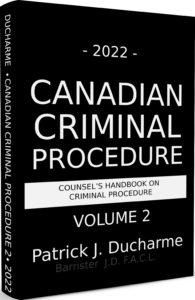 |
| Patrick Ducharme |
The Rules of the Game
Subsection 482(1) of the Code authorizes every Superior Court to make rules consistent with a Federal statute. Subsection 482(2) provides a similar power to Provincial courts, subject to the approval of the Lt. Governor-in-Council of the Province. Sections 169 and 170 of the Courts of Justice Act create the Criminal Rules Committee and a procedure for enacting rules related to criminal proceedings. These are the rules permitted by section 482 of the Code. The Rules of the Ontario Court of Justice in Criminal Proceedings apply to all trials in the Ontario Court of Justice.
The Criminal Proceedings Rules apply to proceedings in the Superior Court of Justice. The rules for Ontario Superior courts contain three themes. They are all specific to trials. They deal with exclusion of evidence, production of third-party records and applications regarding evidence of the complainant’s prior sexual conduct. The rules for Superior Court do not presently contain any specific rules applicable to trial proceedings or evidence. Rule 1.02 provides that the rules apply to “prosecutions, proceedings and applications”.
While the Superior Court has an inherent jurisdiction to award costs against orders or judgments of the inferior court, the power is used sparingly and only where the circumstances are tantamount to a contempt of court or reveal malice or bad faith thereby creating a flagrant injustice. Moreover, before the order is made the Judge of the inferior court is entitled to notice and an opportunity to be heard on the question of costs.1 Subsection 482(2) provides as follows:
482(2) The following courts may, subject to the approval of the lieutenant governor in council of the relevant province, make rules of court not inconsistent with this Act or any other Act of Parliament that are applicable to any prosecution, proceeding, including a preliminary inquiry or proceedings within the meaning of Part XXVII, action or appeal, as the case may be, within the jurisdiction of that court, instituted in relation to any matter of a criminal nature or arising from or incidental to the prosecution, proceeding, action or appeal:
a. every court of criminal jurisdiction for a province;
b. every appeal court within the meaning of section 812 that is not a court referred to in subsection (1);
c. the Ontario Court of Justice;
d. the Court of Quebec and every municipal court in the Province of Quebec;
e. the Provincial Court of Nova Scotia;
f. the Provincial Court of New Brunswick;
g. the Provincial Court of Manitoba;
h. the Provincial Court of British Columbia;
i. the Provincial Court of Prince Edward Island;
j. the Provincial Court of Saskatchewan;
k. the Provincial Court of Alberta;
l. the Provincial Court of Newfoundland;
m. the Territorial Court of Yukon;
n. the Territorial Court of the Northwest Territories; and
o. the Nunavut Court of Justice.
Subsection 482(3) outlines the parameters that these rules may regulate and subsection (4) requires publication of the rules in the Canada Gazette. Subsection (5) permits the Governor in Council to ensure uniformity of the rules of court in criminal matters and that any uniform rules made under this subsection prevail.
Needless to say then, any student of criminal procedure must also be familiar with the particular rules promulgated by any province or territory. And, it is predictable that for major trials at least case management Judges are likely to be assigned. The discretion to appoint a case management Judge rests with the Chief Justice or her designate. The application for the appointment of the case management Judge may be made by the defence, the prosecutor or the Chief Justice. Section 551.1 provides:
551.1(1) On application by the prosecutor or the accused or on his or her own motion, the Chief Justice or the Chief Judge of the court before which a trial is to be or is being held or the Judge that the Chief Justice or the Chief Judge designates may, if he or she is of the opinion that it is necessary for the proper administration of justice, appoint a Judge as the case management Judge for that trial at any time before the jury selection, if the trial is before a Judge and jury, or before the stage at which the evidence on the merits is presented, if the trial is being heard by a Judge without a jury or a provincial court Judge.

The above is the an excerpt of Patrick J Ducharme's book, Canadian Criminal Procedure Volume 2, available at Amazon or in bulk through MedicaLegal Publishing along with Criminal Trial Strategies.
Subscribe to Patrick Ducharme's Youtube Channel
